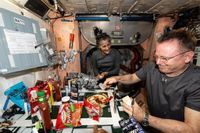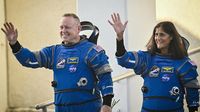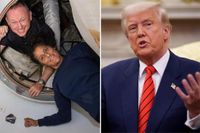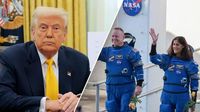In a surprising move, President Donald Trump announced on Friday, March 21, 2025, that he would personally cover overtime pay for astronauts Suni Williams and Butch Wilmore, who spent an astonishing 286 days stranded at the International Space Station (ISS) due to a spacecraft malfunction. During an interview with Fox News’ Peter Doocy, Trump expressed his disbelief at the paltry compensation offered by NASA, stating, "If I have to, I’ll pay it out of my own pocket." This statement came after Doocy revealed that the astronauts were only entitled to $5 per day for incidentals, approximately $1,430 for the entire duration of their unintended mission in space.
Williams and Wilmore had initially embarked on what was planned as an eight-day mission in June 2024. However, that timeline quickly changed when their spacecraft malfunctioned, forcing them to remain in orbit far beyond the expected duration. Trump reflected on their ordeal, stating, "Is that all? That’s not a lot, for what they had to go through." In this context, his promise to supplement their pay stands out as a significant gesture, highlighting an often overlooked aspect of astronauts' sacrifices.
Previously, a NASA spokesperson, Jimi Russell, noted that while in space, astronauts are classified as federal employees on official travel orders. This designation means that they do not accrue overtime or holiday compensation like other workers, and despite their grueling circumstances, they were essentially restricted to that minimal $5 daily allowance. Russell's comments, coupled with Trump's declarations, suggest a troubling disconnect between governmental policy and the realities faced by astronauts in exceptional situations.
Trump's comments were not merely politically charged; they also reflected concerns about the physical toll that such lengthy space travel can take on astronauts. "Even though they're in the capsule up there, the body starts to deteriorate after nine or ten months and gets really bad after 14-15 months," he remarked, underscoring the urgency of their rescue. The physical ramifications of extended time in space have been well documented and include muscle atrophy and bone density loss, raising valid questions about the long-term impacts on astronauts who find themselves in such precarious situations.
The astronauts were finally rescued last week, with a SpaceX Crew Dragon capsule making a timely arrival at the ISS. The mission, led by tech entrepreneur Elon Musk's SpaceX, culminated in their dramatic return to Earth on March 18, 2025. Their capsule made a successful splashdown in the Gulf of America off Tallahassee, Florida, where they were whimsically greeted by dolphins, adding a touch of joy to their otherwise harrowing experience.
Trump’s remarks also included a nod of gratitude towards Musk, whose quick actions facilitated the astronauts' return. "Think if we don't have him?" Trump said, referring to the urgency of SpaceX’s response to the astronauts’ distress. He candidly acknowledged, "If we don't have Elon, they could be up there a long time. Who else is going to get them?" This acknowledgment not only emphasizes Musk's critical role in modern space travel but also casts light on the broader collaboration between government and private sectors in advancing space exploration.
While the astronauts were completing their mission, they traveled approximately 121 million miles and completed around 4,576 orbits around the Earth, a remarkable feat that starkly contrasts with their modest per diem compensation. Each astronaut earns a base salary of around $152,258 per year, but their pay system left them with the impression of being significantly undervalued when they returned.
As the situation unfolded and garnered public attention, the issue of how astronauts are compensated for extraordinary circumstances like this one has sparked discussions about the need for reform. Critics have pointed out that even as astronauts conduct vital research and maintain operations aboard the ISS, their financial remuneration fails to reflect the complexities and dangers inherent in such work.
In light of these events, Williams and Wilmore's case illustrates the challenges faced by federal employees placed in extraordinary roles that defy conventional expectations. While their heroism and dedication to science and humanity are unquestioned, the financial and physical repercussions of their space odyssey deserve recognition and support.
As Donald Trump steps up to offer personal financial assistance, it raises broader questions about the value placed on our astronauts—men and women who truly operate at the edge of human capability and endurance. As the American public and space agencies reflect on this episode, one can only hope that the conversation will lead to improved policies that honor their remarkable contributions to science and exploration.








